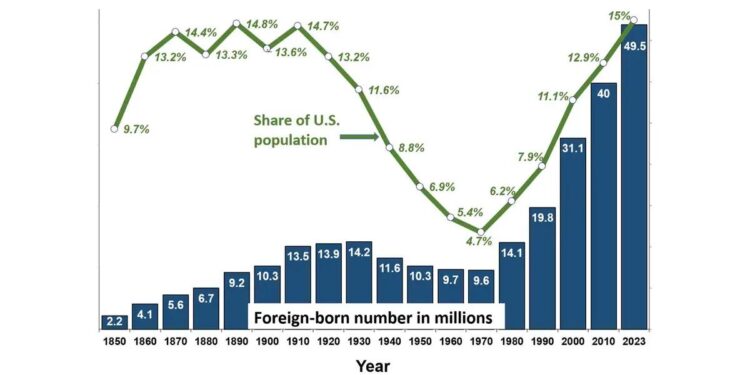A new study reveals that the initial heart health advantage observed in long-term immigrants to the United States diminishes over time, largely due to lifestyle changes and increased stress. Researchers warn that as immigrants adapt to American behaviors and face mounting pressures, their risk factors for cardiovascular disease rise, undermining the early protective benefits. This emerging evidence highlights the urgent need for targeted public health strategies to support the well-being of immigrant communities across the nation.
Lifestyle Changes Undermine Cardiovascular Benefits in Long-Term US Immigrants
Recent research reveals that the heart health advantage often observed in new US immigrants diminishes significantly over time, largely due to evolving lifestyle habits and heightened stress levels. While initial immigrants tend to maintain healthier diets, engage in more physical activity, and exhibit lower smoking rates, these protective factors erode the longer individuals remain in the country. Key lifestyle shifts contributing to this decline include increased consumption of processed foods, reduced exercise frequency, and adoption of more sedentary routines influenced by cultural assimilation and environmental factors.
Moreover, chronic stress related to social, economic, and occupational challenges plays a critical role in offsetting early cardiovascular benefits. Experts highlight the interplay of these factors in accelerating risk for hypertension, diabetes, and other conditions linked to heart disease. The following table outlines the primary behavioral and environmental changes observed among long-term US immigrants that contribute to their increased cardiovascular risk:
| Factor | Short-Term Immigrants | Long-Term Immigrants | Impact on Heart Health |
|---|---|---|---|
| Diet Quality | Predominantly fresh, home-cooked meals | High intake of processed, fast foods | Increased risk of obesity & hypertension |
| Physical Activity | Regular moderate exercise | More sedentary lifestyle | Reduced cardiovascular fitness |
| Stress Levels | Lower perceived stress | Elevated chronic stress | Higher inflammation & heart disease risk |
| Smoking Rates | Relatively low tobacco use | Increased smoking prevalence | Greater risk for vascular damage |
Chronic Stress and Its Impact on Heart Health Among Immigrant Communities
Immigrant communities in the United States often arrive with a heart health advantage, attributed to healthier lifestyle habits and strong cultural ties. However, this advantage diminishes significantly over time, largely due to the cumulative effects of chronic stress. Factors such as socioeconomic pressures, discrimination, language barriers, and unstable employment create an ongoing state of psychological strain. Studies show that these persistent stressors contribute to elevated blood pressure, inflammation, and other cardiovascular risks, undermining the protective benefits previously observed among newer arrivals.
Key contributors to chronic stress in immigrant populations include:
- Prolonged exposure to workplace discrimination and job insecurity
- Limited access to culturally competent healthcare services
- Social isolation and disrupted family support systems
- Challenges related to legal status and fear of deportation
| Stress Factor | Impact on Heart Health |
|---|---|
| Discrimination | Increased hypertension risk |
| Job Instability | Elevated cortisol levels |
| Healthcare Access | Delayed diagnosis, progression of heart disease |
| Social Isolation | Increased inflammation |
Expert Recommendations for Managing Stress and Promoting Heart Wellness in Immigrants
Healthcare professionals emphasize a holistic approach to mitigate the stressors faced by long-term immigrants that contribute to declining heart health. Strategies center around integrating culturally sensitive stress management techniques alongside traditional medical interventions. Regular physical activity tailored to individual cultural preferences, such as community dance classes or group walks, offers dual benefits by alleviating stress and improving cardiovascular fitness. Additionally, fostering strong social support networks within immigrant communities helps counteract isolation, a known risk factor for cardiac issues.
Nutrition experts advocate for dietary adjustments that honor cultural food practices while promoting heart wellness. Substituting high-fat and processed items with natural, heart-friendly alternatives can significantly reduce cardiovascular risk. Below is a summary of key recommendations:
- Incorporate mindfulness and relaxation exercises such as deep breathing or guided meditation adapted to cultural contexts.
- Encourage regular cardiovascular screenings to detect early signs of heart disease especially for individuals with prolonged U.S. residency.
- Promote community-led wellness activities that blend traditional values with evidence-based health practices.
| Recommendation | Impact | Example |
|---|---|---|
| Mindfulness Integration | Reduced stress levels | Guided cultural meditation sessions |
| Dietary Modification | Lower cholesterol | Swapping fried foods with baked alternatives |
| Social Support | Improved mental health | Community health groups |
Insights and Conclusions
As research continues to uncover the complex interplay between lifestyle, stress, and cardiovascular health, these findings underscore the urgent need for targeted public health interventions aimed at supporting long-term immigrants in the United States. Addressing dietary habits, stress management, and access to healthcare could prove vital in preserving the heart health advantage often observed upon arrival. As immigrant populations grow and age, understanding and mitigating these risks will be crucial in reducing health disparities and improving outcomes for diverse communities nationwide.










